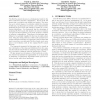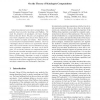450 search results - page 58 / 90 » Algorithmic uses of the Feferman-Vaught Theorem |
134
click to vote
ICCAD
2002
IEEE
15 years 10 months ago
2002
IEEE
In this survey, we outline basic SAT- and ATPGprocedures as well as their applications in formal hardware verification. We attempt to give the reader a trace trough literature and...
116
click to vote
GECCO
2008
Springer
15 years 3 months ago
2008
Springer
The No-Free-Lunch theorem is a fundamental result in the field of black-box function optimization. Recent work has shown that coevolution can exhibit free lunches. The question a...
123
click to vote
ICML
2004
IEEE
16 years 2 months ago
2004
IEEE
Synchronous reinforcement learning (RL) algorithms with linear function approximation are representable as inhomogeneous matrix iterations of a special form (Schoknecht & Merk...
COCO
2007
Springer
15 years 8 months ago
2007
Springer
Valiant has proposed a new theory of algorithmic computation based on perfect matchings and Pfaffians. We study the properties of matchgates—the basic building blocks in this n...
127
click to vote
ICML
2004
IEEE
16 years 2 months ago
2004
IEEE
Kernel conditional random fields (KCRFs) are introduced as a framework for discriminative modeling of graph-structured data. A representer theorem for conditional graphical models...


